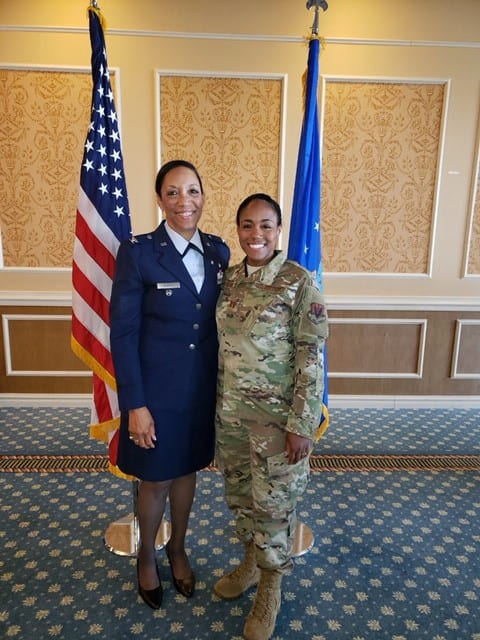Written by Kim Furlow, communications manager for the Institute for Public Health

She was the first woman of color in the Air Force Medical Service Corps to receive the rank of Colonel. Now she uses career lessons to benefit others.
As part of the Women Leaders in Public Health Lecture Series and the Institute for Public Health Summer Research Program Seminar Series – Public and Global Health Track, retired Colonel Pauletta Blueitt, MHA and an advisory board chair to the Texas A&M University School of Public Health will present, “A Personal Journey: the Evolution of a Career in Military Medicine”, June 26th. Read more event details.
Despite experiencing adversity along the way, Colonel Blueitt says she enjoys talking about how her career path played out and eventually led to her true passion: mentorship.
It started with a call from a Reserve Officer Training Corps (ROTC) recruiter who, in the mid-1970’s, was looking for diverse men (and especially) women with high SAT scores like Blueitt, to join U.S. university ROTC programs. Her parents, encouraged her to join as a pathway to additional opportunities. Blueitt chose Texas A&M and dove into the ROTC program full time. “Back then, even though women were accepted into the program, no one wanted us there, especially women of color, so the physical, emotional and verbal abuse was sometimes extreme,” says Blueitt.
She persevered and overcame to eventually be commissioned as a Medical Service Corps officer. In civilian language, this is a healthcare administrator in a military branch of service. It was at her second duty assignment at Scott Air Force Base that Blueitt became an Aeromedical Evacuation Operations Officer. “It made me mature faster having to be quick on my feet, make life-altering decisions and engage in logical deductive reasoning in order to help patients in crisis,” she says.
Her passion for helping others increased enough to pursue a career in public health so she acquired a Masters in Health Administration from Washington University in St. Louis.
As dramatic and heart-wrenching as it was, Blueitt says one of the highlights of her career was being stationed in Washington D.C. during the devastating events of 9/11. During this time, she was appointed director of the emergency center responsible for tracking Pentagon victims and apprising the White House of their whereabouts and care. She describes the time as “painful but rewarding”.
Following her promotion to Air Force Colonel (the first African American woman in her field of study to be promoted to this rank) Blueitt says she gained a sense of “wanting to help those who come after her.” She has mentored many other African American women in the military including her own daughter, guiding several to the rank of Colonel. She finally retired after 28 and a half years of military service-six years longer than is required.
She now sits as chair on the Texas A&M University School of Public Health External Advisory Board and still gets calls asking for her mentorship from those who aspire to be like h
She now sits as chair on the Texas A&M University School of Public Health External Advisory Board and still gets calls asking for her mentorship from those who aspire to be like her—a strong black woman who changed the landscape for women in military medicine.